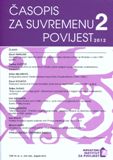Politika Hrvatsko-srpske koalicije uoči Prvoga svjetskog rata 1907.–1913.
Politics of the Croat-Serb Coalition Before the World War I, 1907-1913
Author(s): Ivan BulićSubject(s): History
Published by: Hrvatski institut za povijest
Keywords: Croat-Serb coalition; Svetozar Pribićević; Commissariat; Unionism; Kingdom of Serbia; Croatian ban Ivan Skerlecz; World War I
Summary/Abstract: During the years before the World War I, the ruling Croat-Serb coalition showed great pragmatism in the political life of Croatia-Slavonia. It knew how to gain advantage from the multiple divisions that were the consequence of the dualist organization of the Austro-Hungarian Empire. Although in 1913 Hungarian government decided to support Croat-Serb coalition in order to gain control over Croatia, the outcome was different because the Coalition had different long-term plans and its leading elements coordinated their activities with the official policy of Kingdom of Serbia. Later, during 1918, the international relations became the most important not only for Croatia, but for the whole Austro-Hungarian Empire. Because of such development plans of the Hungarian government from 1913 became less relevant, while the previously secret plans of the one part of the leadership of Croat-Serb coalition gained importance. Therefore the actions of Hungarian leadership, although indirectly, affected the Croatian political future after the collapse of the Austro-Hungarian Empire.
Journal: Časopis za suvremenu povijest
- Issue Year: 44/2012
- Issue No: 2
- Page Range: 415-453
- Page Count: 39
- Language: Croatian

